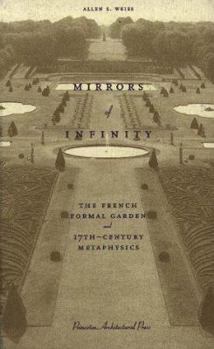Mirrors of Infinity:: The French Formal Garden and 17th-Century Metaphysics
From the Japanese Zen Garden to Andr Le Notre's Versailles, the history of landscape reveals that every garden embodies a philosophy. Focusing on the metaphysics, aesthetics, and theology of the seventeenth century, Allen Weiss's analysis offers new insight into the major gardens of this period: Vaux-le-Vicomte, Chantilly, and Versailles. From the Meditations of Descartes and Pascal's Penss, to the intrigues of court politics, Weiss reveals how the...
Format:Paperback
Language:English
ISBN:1568980507
ISBN13:9781568980508
Release Date:December 1997
Publisher:Princeton Architectural Press
Length:144 Pages
Weight:0.45 lbs.
Dimensions:1.0" x 1.0" x 1.0"
Age Range:13 years and up
Grade Range:Grade 8 to Postsecondary
Customer Reviews
3 ratings
A Paradigm
Published by Thriftbooks.com User , 18 years ago
What would you rather do, talk about making love, or make love? If your answer is the former, then (A) please don't bother reading on, and (B) good luck! Talking about making love makes absolutely no sense whatsoever. It's absurd! The same holds true of art. Oh yes, there are those movie critics, art critics, music and CD critics, you know, all those people who think that their opinion matters. (What's worse, of course, is to write a critique of a critique as I'm doing here [lol].) Think about it in practical terms: out of a population of six billion people, why would you rely on the opinion of ONE human being? That makes no sense whatsoever. If you wanted some sort of opinion that was worth a hoot, wouldn't you ask more than one person? Or even more importantly, why wouldn't you trust your OWN judgment instead of somebody else's? Makes no sense to me whatsoever! Unlike other disciplines -- politics, religion, sports, etc. -- there is no "middle man" in the arts: there is no politician, no priest, no referee. ONLY in the arts do you have a direct relationship between the two parties, that being the art object -- the particular work of art -- and the "receiver" who "interacts" with it -- the listener, the viewer, the reader, etc. What a unique, simple yet powerful relationship and process! So, IF you are going to write about art, you better do it right: you better speak the truth by examining the subject methodically. And this is exactly what Mr. Allen S. Weiss has done in his "Mirrors of Infinity: The French Formal Garden and 17th-Century Metaphysics." Mr. Weiss has chosen a very narrow subject for his dissertation: the aesthetic examination of the French Baroque garden through the analysis of only three gardens -- Vaux-le-Vicomte, Versailles and Chantilly -- by the era's greatest champion, Andre Le Notre. (Note that I did NOT state `three masterpieces', because, as Mr. Weiss will correctly prove, the gardens of Versailles are NOT a masterpiece. It might be one in terms of size, but certainly not in terms of design. It was a surprise to me, too.) At the core of Mr. Weiss's dissertation is his examination of this era's logic through its aesthetics, and therefore, he begins the book with the analysis and explanation of the contemporary paradigm both in the arts, philosophy and sciences. Excellent! (Every landscape design book should do that.) In the Preface, Mr. Weiss discusses the aesthetics of various garden designs of various eras, i.e., the Zen garden, the Italian Renaissance garden, etc., in order to provide a general background of garden logic, so to speak. Also, it is important to note that Mr. Weiss, throughout the book, questions the visitor of why he/she visits a garden and how this mindset affects our perceptions of a garden! In the subsequent chapter, Mr. Weiss explains the aesthetic transformation that occurred within the Baroque era from "motion" to rigidity, the latter being the paradigm for Le Notre. In the following three chapters
The Quotation of Versailles
Published by Thriftbooks.com User , 24 years ago
This book was recommended as further reading in my History of European Garden Design course, and proved helpful in understanding the quotation of Versailles to the imperial gardens of Rome, and then lead me to research why L'Enfant would use Versailles for the blueprint of Washington D.C.
Elegant, gracefully erudite, and concise.
Published by Thriftbooks.com User , 26 years ago
An elegant, gracefully erudite and concise intellectual history. It is a focussed and yet wide-ranging look at the function and meaning of French 18th century formal gardens, specifically Vaux-le-Vicomte, Versailles, and Chantilly. The sources cited are also fascinating, and it is a book that leads you to many others. I found it quite wonderful, and am looking forward to reading more by the author.






